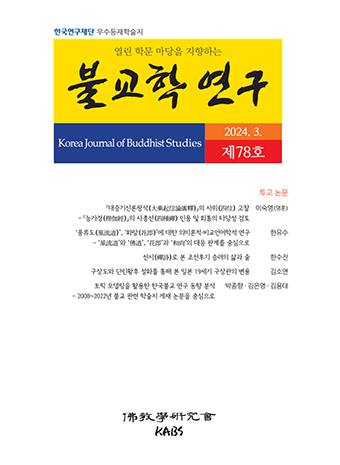Abstract
References
Sorry, not available.
Click the PDF button.
Information
In this paper I will discuss a characteristics of the kula-putra and kula-duhitṛ in the Mahāprajñānapāramitā-sūtra. Generally their chara cteristics in this text can classify three kinds as follows. First, The kula-putra(son of good family) and kula-duhitṛ(daughter of good family) in the Āgama(阿含) indicate simply the son and daughter of good family, the married buddhists before the leaving home buddhist, and the married buddhists accumulating virtuous deeds in order to born th heaven on the next life. But whichever case you may take, it indicates the mairried buddhist.Second, We can understand in the two aspects about the relation between the kula-putra or the kula-duhitṛ and the Bodhisattva as the independent practitioner in the Mahāyāna-Buddhism. One is the case that it call Mahābodhisattva(大菩薩), such as Avalokiteśvara(觀自在菩薩). This occasion is used the vocative case. The other case, even if the kula-putra or the kula-duhitṛ produced bodhicitta, indicates an ordina ry person-bodhisattva(凡夫菩薩) who does not yet have a certain belief of the prajñānapāramitā(般若波羅蜜). But we can know this two used different usages in the Mahāpra jñānapāramitā-sūtra. The former used mainly the partner to explain the prajñānapāramitā. But this case does not use the kula-putra with the kula-duhitṛ, but mostly only kula-putra. The latter is the case that the kula-putra or the kula-duhitṛ has been practice six prajñāna pāramitā for a long time from the past times. This typical example is Sadāpralā pa-bodhisattva(常啼菩薩). Third, the characteristics of the kula-putra or the kula-duhitṛ is the devotee that listens, accepts, and memories the prajñānapāramitā, writes, keeps, respects and offers the Mahāprajñānapāramitā-sūtra, the conveyor and keeper who hands down and keeps up the Mahāprajñāna pāramitā- sūtra or the Dharma-bhāṇaka(法師) who have other persons write, give, accept and keep the Mahāprajñānapāra mitā-sūtra, and speeches, teaches, discriminates, explains and comment on prajñāna pāramitā to other persons by various cause and occasion. In this case the Dharma- bhāṇaka is a nickname of the Bodhisattva. In conclusion, the kula-putra or the kula-duhitṛ is the open-hearted name to anyone who wish to become the buddha without the married buddhists and the leaving home buddhist, or the degree of the disci pline in the Mahāprajñānapāramitā-sūtra.
Click the PDF button.
- Publisher :Korean Association of Buddhist Studies
- Publisher(Ko) :불교학연구회
- Journal Title :Korea Journal of Buddhist Studies
- Journal Title(Ko) :불교학연구
- Volume : 2
- No :0
- Pages :151~192


 Korea Journal of Buddhist Studies
Korea Journal of Buddhist Studies






